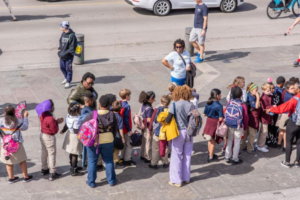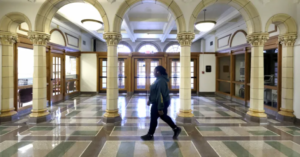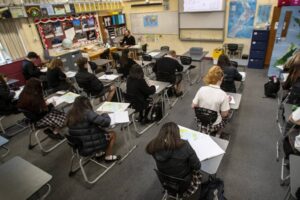Tennessee education chief touts Memphis efforts to combat learning loss
4 min read
Shelby County Schools officials targeted their Summer Learning Academies to students who struggled the most this year, hoping that students in the bottom 20% academically, or about 20,000 students, would enroll. Fewer than half of that number showed up.
About 9,000 students are attending the math and reading focused program this month. While the figure is below the initial target, it is more than the 6,000 students who attended in previous summers, said Memphis officials.
Districts across Tennessee organized similar academies in a statewide effort to mitigate summer slide and learning loss caused by a disrupted school year of hybrid and virtual learning amid the pandemic.
The Memphis program, which kicked off on July 6 and runs through July 30, started later than many other programs in the state, so Shelby County was one of the last stops on Tennessee Education Commissioner Penny Schwinn’s statewide tour of summer programs. During a visit to Lowrance K-8 School Monday morning, Schwinn said that she’s pumped about the data that she’s seen from programs that have already finished.
Students receive state-mandated pre- and post-tests that measure their academic levels. Schwinn said that the fully analyzed data will be ready in mid-September, but she added that the summer camps have an impact beyond test scores.
“We have seen, when we talk to students, a level of confidence that is being built in them,” she said. “When you have small class sizes like you see in summer programs, when you have really intentional instruction focusing on what this group of children needs, you see this confidence grow, and you can’t measure that in the same way that you can a pre-and post-test.”
Superintendent Joris Ray added that the Memphis program has another important effect: It helps keep kids safe by giving them an alternative to hanging outside all summer as the city endures a crime wave.
Health and safety were also behind the district’s decision to require all students and school-based faculty members to wear masks next school year, making it one of the only districts in the state to maintain the COVID prevention measure. Ray said he based the decision on the guidance recently issued by the American Academy of Pediatrics.
Fifth-grade teacher Keith House, whose class got a visit from Schwinn during her tour Monday, said that he’s fine with wearing a mask.
“Having to wear the kind of mask I had to wear in the military, this is nothing,” said House, a retired U.S. Army officer.
“It’s just a formality. We’re going to do what we have to do to make it work. That’s what we’ve done so far this year,” he added.
For House, teaching during a pandemic has meant remaining flexible, and opting to work summer school for the first time was part of that.
Most of the soon-to-be sixth graders in his classroom this summer are the same fifth graders he taught online this year.
“I had an interesting group of kids,” he said.
“Working with them virtually this year, I only got to see a screenshot of them,” he added. “The personalities that I met on screen were very intriguing to me. And I said, ‘Let’s see what we can really do when we get together, and I get in front of you and you get in front of me.’”
House paused his lesson on woolly mammoths as Schwinn and members of the media toured his classroom, and his curious students seized the opportunity to quiz the commissioner.
Schwinn explained some of her duties and responsibilities to House’s class, leading student Khloi Cole to ask a poignant question about Schwinn’s job.
“Is it hard?” asked Cole.
“That was a really sweet question. I haven’t gotten that question before,” said Schwinn.
“Yes, it’s hard because you have really, really important decisions that you have to make for a whole bunch of students,” Schwinn added. “If you make the wrong decision, it impacts people like you, right, and students like you in this classroom, so I think that’s the hardest part.”
Part of the hard work ahead for Schwinn and district officials is rebounding from a year of disrupted connections and disrupted learning.
Shelby County Schools reopened its buildings to students in March, making it one of the last school districts in the state to offer in-person learning.
Early messaging from district officials indicate that the district’s decision to continue virtual learning into the spring may have affected students’ academic gains. The district is analyzing its results from the TCAP state assessments held in April, and it will release the results on Aug. 2.
Since the pandemic took hold, standardized test scores have been down nationwide including declines on many Advanced Placement tests and at the state and local levels in places such as Indiana, Arkansas and Newark.
To address some of these issues, Memphis school officials are using federal stimulus money and money from their county allocation to secure more tutors for students. Officials also have committed to hiring more teachers and teaching assistants to achieve a 13 to 1 student to adult ratio in kindergarten through second grades.
The state is also pumping more money into schools by providing grants for school innovation, including a $114,00 grant to improve science, technology, and agricultural studies at Bolton High School, and additional money and support for teacher training like the Reading 360 literacy program and the trauma-informed schools program.
Schwinn is overseeing some of these efforts.
“We had a really, really disrupted year, and it’s been very, very difficult for everybody,” said Schwinn. “We are, like our districts, focusing on what comes next.”
This article was originally posted on Tennessee education chief touts Memphis efforts to combat learning loss







